
Lien vers l'afficheWorkshop on Kähler and related geometries Lien vers le programme
A special trimester on Kähler and related geometries will be held at Nantes University from september 21th to december 18th 2009. The topics of interest are :
The trimester will consist of two events :
Workshop organisé à Angers, par Jean-Jacques LOEB directeur du LAREMA, qui portera sur l'interaction entre l'analyse complexe et les groupes de Lie. Deux thèmes seront particulièrement abordés :
Les invités sont :
Les deux premières personnes ont beaucoup travaillé sur les actions de groupes de Liens sur les variétés complexes. Le troisième est un spécialiste des feuilletages. Des exposés auront lieu sur les thèmes 1 et 2.
Une place très importante sera donnée aux discussions concernant ces thèmes, mais aussi de manière générale, sur les liens groupes de Lie-analyse complexe (par exemple théorie des invariants, enveloppe d'holomorphie invariante, etc.).
Le 5th Colloquium on Backward Stochastic Differential Equations, Finance and Applications sera organisé au Mans, du 18 au 20 Juin 2008, à l'Université du Maine.
 Le Laboratoire Angevin de REcherche en MAthématiques, à Angers, organise du 9 juin 2008 au 13 juin 2008, un workshop : "The First Angers workshop in real algebraic geometry"
Le Laboratoire Angevin de REcherche en MAthématiques, à Angers, organise du 9 juin 2008 au 13 juin 2008, un workshop : "The First Angers workshop in real algebraic geometry"
Principaux thèmes :
Le workshop est organisé par Jean-Philippe Monnier et Adam Parusiński.
Liste des Participants:
 Matpyl Spring activity on vector bundles overs curves
Matpyl Spring activity on vector bundles overs curves
We will start on Monday at 9h. Registration 8h30!
This page is an overview of the topics that will be treated by the activity. Names behind the lectures indicate the distribution of the talks to be given by the participants.
There will be 6 lectures of 45 minutes a day, scheduled as follows
09h00 - 09h45 Lecture 1
09h45 - 10h15 Coffee break
10h15 - 11h00 Lecture 2
11h15 - 12h00 Lecture 3
12h00 - 14h00 Lunch
14h00 - 14h45 Lecture 4
15h00 - 15h45 Lecture 5
15h45 - 16h15 Coffee break
16h15 - 17h00 Lecture 6
Monday
AM : Salle Hypathia
Lecture 1 [Chloé Grégoire]
References [HL],[Se],[LeP]
Lecture 2 [Arvid Perego]
References [Se]
Lecture 3 [Heinrich Hartmann]
References: [LeP] and [HL]
PM : Salle Au Val
Lecture 4 [Yashonidhi Pandey]
References: for general facts on the algebraic fundamental group see e.g. chapter 9 by A. Mézard in [BLR], on the relative/absolute Frobenius see e.g [Ray] section 4.
Lecture 5/6 [Christian Lehn & Markus Zowislok]
Reference: [K] section 5, [Ray] section 4, [LP], [RR]
Tuesday : Principal $G$-bundles
AM : Salle Eole
Lecture 1 [Manfred Lehn]
Reference: [Spr]
Lecture 2 [Tanja Becker]
References: [So], [Ra]
Lecture 3 [Heinrich Hartmann]
References: [Ra], [So1], [N]
PM : Salle Au Val
Lecture 4 [Olivier Serman]
Reference: [Beh] (8.2.6), [HN]
Lecture 5 [Jochen Heinloth]
Existence and uniqueness of canonical reduction of $E_G$ (with sketch of proof...)
References: mainly [B]; see also [BH], [AB]
Lecture 6 [Jochen Heinloth]
References: [B], [IMP], [He2]
Wednesday: moduli spaces
AM : Salle Hypathia
Lecture 1 [Alessandra Sarti]
References: [HL] Section 2.2, section 4; [Do], [LeP]
Lecture 2 [Alessandra Sarti]
References: [LeP]
Lecture 3 [Samuel Boissière]
References: [LeP]
PM Salle Hypathia
Lecture 4 [Samuel Boissière]
References: [BLS]
Lecture 5 [Olivier Serman]
References: [Lan], [HL] section 2B for the vector bundle case; [BP], [F], [He1] for $G$-bundles
Lecture 6 [Etienne Mann]
[FMW], [Las]
Thursday: Conformal blocks and Verlinde formula
AM : Salle des séminaires
Lecture 1 [Timo Schürg]
[Go], [So1]
Lectures 2/3 [Manfred Lehn]
References: [So1], [BL], [LS2], [F2]
PM : Salle Hypathia
Lecture 4 [Manfred Lehn]
[So2], [SU]
Lecture 5 [Christoph Sorger]
References: [So1],[So3],[BL], [LS2], [F2]
Lecture 6 [Christian Lehn]
[BL], [LS2]
Friday: projective connections, WZW and Hitchin
AM : Salle Hypathia
Lectures 1/2/3 [Christian Pauly]
PM : Salle Au Val
Lectures 4/5/6 [Christoph Sorger]
[Be], [So2]
Saturday: Level-Rank duality
AM : Salle Hypathia
Lecture 1/2 [Rémy Oudompheng]
Lecture 3 [everybody]
References :
Organisers: Manfred Lehn, Christian Pauly, Christoph Sorger
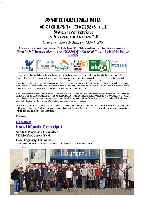 Université du Maine, Le Mans, 16-19 March, 2009 The purpose of this workshop is to stimulate research in statistical inference for continuous time stochastic processes. This branch of mathematical statistics attracts more and more attention of the statisticians and probabilists because first: the real systems are often well described by the continuous time mathematical models (point processes, diffusion processes, stochastic differential equations with partial derivatives, stable processes etc.) and the second: the diversity of the models and the diversity of the statements of the statistical problems make these models quite attractive for the mathematicians because all these allow to obtain many new results which sometimes have no analogue in discrete time models.
Université du Maine, Le Mans, 16-19 March, 2009 The purpose of this workshop is to stimulate research in statistical inference for continuous time stochastic processes. This branch of mathematical statistics attracts more and more attention of the statisticians and probabilists because first: the real systems are often well described by the continuous time mathematical models (point processes, diffusion processes, stochastic differential equations with partial derivatives, stable processes etc.) and the second: the diversity of the models and the diversity of the statements of the statistical problems make these models quite attractive for the mathematicians because all these allow to obtain many new results which sometimes have no analogue in discrete time models.
Lien vers le site web au Larema, Angers
Ce workshop réunira des chercheurs de qualité travaillant dans le domaine de risque de crédit et de martingales d'Ocone. Cette manifestation nous aidera certainement de progresser rapidement dans le domaine.
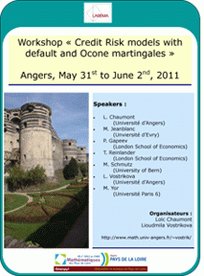
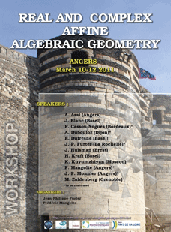 Real and complex affine algebraic geometry, first Angers 10-12 mars 2011
Real and complex affine algebraic geometry, first Angers 10-12 mars 2011
Speakers :
H. Kraft (Basel) A. Dubouloz (Dijon) E. Dufresne (Basel) J.-P. Furter (La Rochelle) J. Huisman (Brest) A. Assi (Angers) F. Mangolte (Angers) J.-P. Monnier (Angers) K. Kuyumzhiyan (Moscou) S. Lamy (Warwick) P. Cassou-Nogues (Bordeaux)* M. Zaidenberg (Grenoble)
*To be confirmed
Organizers : Jean-Philippe Furter and Frédéric Mangolte
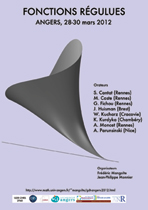 Une fonction régulue sur R^n est une fonction rationnelle prolongeable par continuité sur R^n tout entier. Les propriétés algébriques de l'anneau des fonctions régulues ainsi que les propriétés géométriques de leurs lieux d'annulation commencent à être bien comprises. Ces récents développements sont en lien avec des travaux de W. Kucharz (2009) et de J. Kollár (2011).
Une fonction régulue sur R^n est une fonction rationnelle prolongeable par continuité sur R^n tout entier. Les propriétés algébriques de l'anneau des fonctions régulues ainsi que les propriétés géométriques de leurs lieux d'annulation commencent à être bien comprises. Ces récents développements sont en lien avec des travaux de W. Kucharz (2009) et de J. Kollár (2011).
La classe des fonctions régulues peut-être vue comme une classe intermédiaire entre celle des fonctions algébriques et celle des fonctions arc-analytiques. Ces dernières ont été introduites par K. Kurdyka en 1988 et ont donné lieu depuis à de nombreux travaux (notamment A. Parusinski, E. Bierstone, P. Milman, G. Fichou...). Les ensembles régulus sont les fermés d'une topologie qui est plus fine que la topologie de Zariski et plus forte que la topologie arc-symétrique (lieu d'annulation des fonctions arc-analytiques).
Une série d'exposés dans des séminaires nous a convaincu de l'intérêt d'organiser une rencontre. L'objectif étant de réunir les experts en géométrie algébrique et analytique réelle intéressés par ce sujet émergent pour dresser un état de l'art et définir de nouveaux axes.
Liste préliminaire d'orateurs :
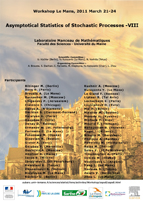 Statistique Asymptotique des Processus Stochastiques VIII
Statistique Asymptotique des Processus Stochastiques VIII
Lien vers l'affiche : affiche_ASSP8.pdf (302.36 Ko)
Université du Maine, Le Mans, 21-24 March, 2011
Sponsors: Université du Maine, FR 2962 du CNRS Mathématiques des Pays de Loire, CUM, Ministère de l'Education nationale, Conseil Général de la Sarthe and Conseil Régional des Pays de la Loire
The purpose of this workshop is to stimulate research in statistical inference for continuous time stochastic processes. This branch of mathematical statistics attracts more and more attention of the statisticians and probabilists because first: the real systems are often well described by the continuous time mathematical models (point processes, diffusion processes, stochastic differential equations with partial derivatives, stable processes etc.) and the second: the diversity of the models and the diversity of the statements of the statistical problems make these models quite attractive for the mathematicians because all these allow to obtain many new results which sometimes have no analogue in discrete time models. Note that solutions obtained for continuous time models can be valid for discrete schemes of observation too. The computer realizations of the statistical algorithms (real data applications) requires that a special attention have to be payed to the effects due to discretization of continuous-time trajectories. Therefore, we wait that one (important) part of the talks will be devoted to statistical inference for discrete time observations (of continuous time systems).
Scientific Programme Committee: U. Küchler, Yu. Kutoyants, N. Yoshida.